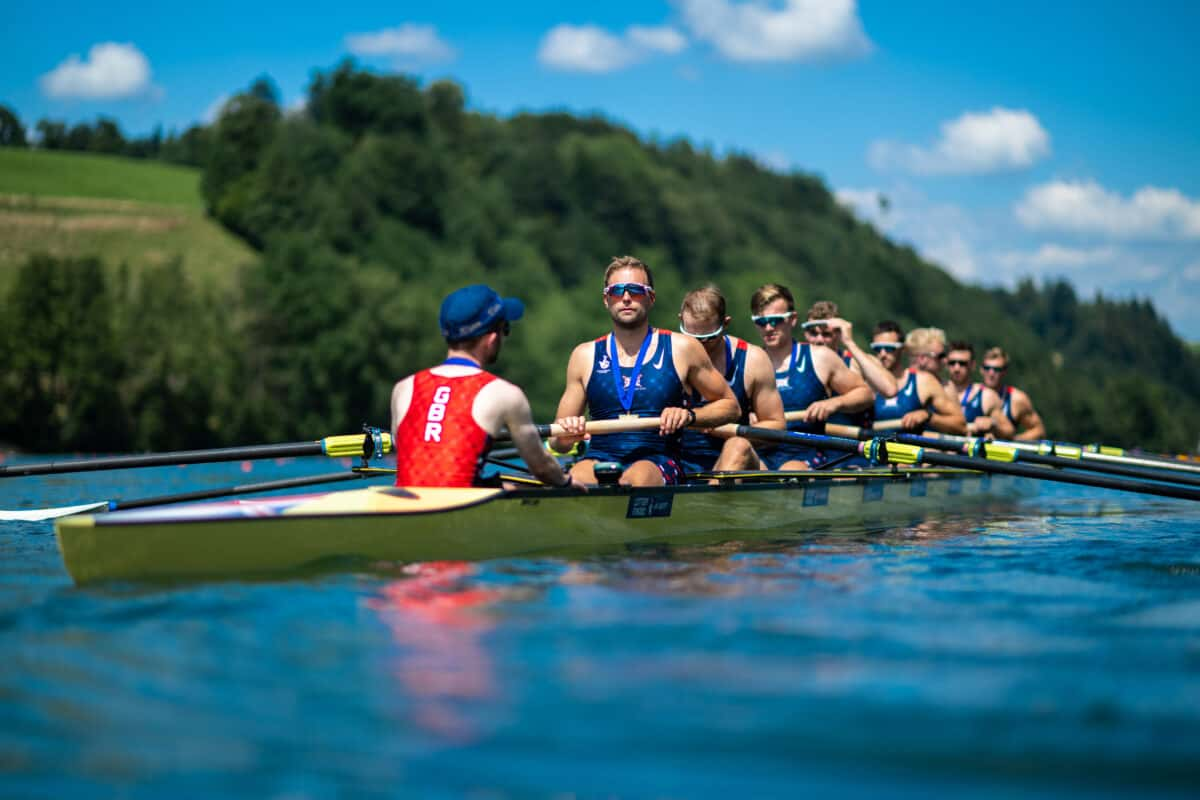
03 Jun 2023
Henry Fieldman's Whirlwind Weekend in Bled
Doubling up in two different crews is far from unheard of – but most rowers are able to plan weeks in advance for such a situation.
That was not the case for British cox Henry Fieldman at the European Rowing Championships in Bled last weekend. On Friday morning Fieldman had trained and raced a preliminary race with the British women’s eight, and was chilling in his hotel room when he got a call: men’s cox Harry Brightmore was unwell, and could Fieldman jump in in his place?
A busy 48 hours followed including pre-paddles, training sessions and two finals. At the end of the weekend, Fieldman came away with gold in the Men’s Eight and silver in the Women’s Eight, and lots of take-aways.
The Men’s Eight final in Bled will surely go down as a classic. After Romania’s trademark fast start Britain got their bows in front and sat about a canvas up on Romania and the Netherlands.
“In many ways we didn’t really go off-plan at all. In that way it was a little bit boring,” says Fieldman. “We got out to an OK start and had a bit of momentum on the field.”
However, Fieldman says the crew had not found their best rhythm, and despite his work learning their race plan and technical focuses, the gel which binds cox and crew together was not quite there.
“We probably weren’t as synched up as we would have been if we’d had a run in together,” he acknowledges.
But the British cruising pace kept them just ahead coming into the last 500m.
“Then it became a case of trying to deliver the plan as best we could. It was pretty matter of fact,” Fieldman says.
Romania hit the front with 150m to go, and Fieldman knew it was time to move.
“In the last 10 strokes it was ‘we’re a seat down and we need to do this’,” he remembers. Then he told the crew, “You’ve got five strokes to give me a seat”.
Across the line, Romania were clearly thrilled with the race, but after a few minutes the result was confirmed: Great Britain had won by 0.05 seconds.
“I was pretty wired after that race and made a conscious decision to really switch off for the rest of that day because I knew I wanted to wind up again for the women’s race,” Fieldman says. “In some ways it was a challenge trying to learn two race plans and two technical focuses and the way two crews do their sessions, but the way the women’s coaches and the women’s eights group worked with me on it, it was as easy as it could be.”
The women’s final on Sunday was another Romania-GB battle, but this time Romania led from the start and earned a clear-water victory.
“Obviously there was a bit of a gap between us and Romania and that was really impressive from them. I was pleased to get the benchmark of where they are,” says Fieldman. “It was great to get a first race on the board, and it was solid. We aspire for more and we’re going to learn everything we can from it.”
Fieldman has switched to the women this season after seven years in the men’s squad, including bronze at the Tokyo 2020 Olympic Games.
“I’ve really enjoyed the change, it’s a new challenge. Sometimes a bit of a change freshens things up in a really positive way,” he says.
Fieldman says he is approaching the women’s project in the same way as a men’s crew, and what he has enjoyed is getting to know a different group of people. Ultimately, he points out, making a crew go fast is the same regardless of gender – and that is the aim for the rest of the season ahead.

